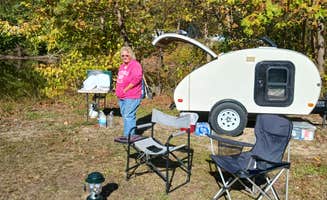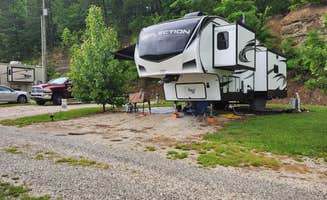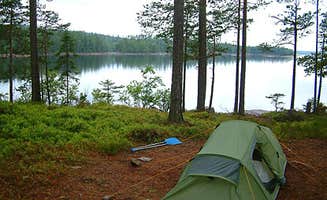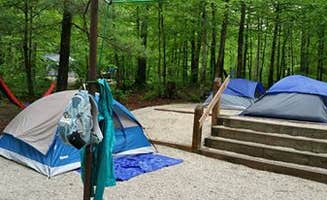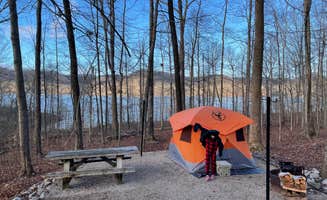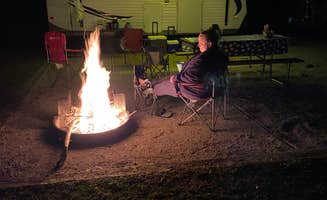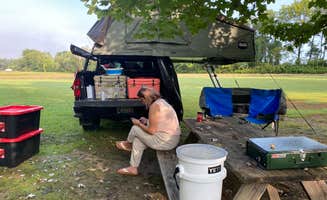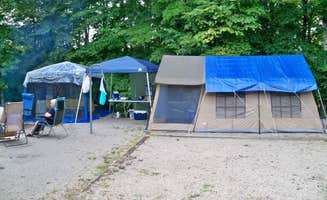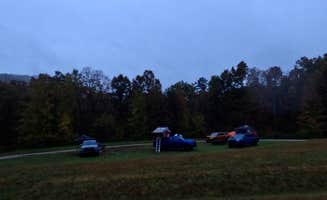The eastern Kentucky forests surrounding Sandy Hook offer diverse camping experiences ranging from lakeside recreation to primitive backcountry sites. Elevations in the region vary from 700 to 1,200 feet, creating moderately challenging terrain for hikers and distinctive camping conditions. Winter temperatures often drop below freezing from December through February, with most developed campgrounds closing for the season.
What to do
Kayaking scenic waterways: Grayson Lake State Park Campground provides access to some of the best paddling near Sandy Hook. "The kayaking is very peaceful and there is a nice lake to explore by Kayak," notes one visitor. The distinctive rock formations accessible by water create unique exploration opportunities.
Trail exploration: Multiple hiking options exist throughout the area, with varying difficulty levels. At Zilpo Campground, "plenty of nice spots to choose from and you can look through and find one to your preference and reserve. In walking distance to the lake so you can have a nice swim." The Daniel Boone National Forest contains extensive trail networks connecting many camping areas.
Cave exploration: Several underground attractions lie within driving distance of Sandy Hook. "The park is amazing and I have no idea how it took me 39yrs to find it so close to home. The caves are absolutely amazing and the park has some of the best natural bridges I have ever seen," reports a visitor to the area, highlighting geological features not found in other nearby recreation areas.
What campers like
Private, well-spaced sites: Campers frequently mention site spacing as a major benefit. At Yatesville Lake State Park Campground, "This is our favorite campground, it's small, quiet, very clean and site are not crammed together." Another visitor added, "Most of the campsites were a decent size."
Water access: Swimming and fishing opportunities are readily available at many locations. "We had a good time kayaking the Southern portion of Grayson Lake in Laurel Gorge and that was much quieter than the Clifty Falls area," mentions a visitor, pointing to lesser-known water access points with fewer crowds.
Clean facilities: Multiple campgrounds maintain well-kept bathhouses, a priority for many visitors. "The bathhouses were immaculate and the grass green and trimmed!" reports one camper. Another notes, "This is the cleanest bath house I've ever seen! Laundry facilities are available."
What you should know
Site selection challenges: Many campgrounds have significant terrain variations affecting site usability. "Bring all the leveling blocks you own because very few sites are level and most are very sloped," warns one camper at Koomer Ridge Campground. "Also bring a very long hose/hose extensions as the sites are well-spaced with water between them, requiring everyone to have long hoses."
Utility hookup variations: Electric and water connections aren't standardized across campgrounds. "You will need extra water hose and extension cords to get hooked up in a lot of the sites," advises a visitor. Another camper mentioned, "Some of the electric sites share one electric box for 2 campsites and can be pretty far from your pad."
Seasonal limitations: Most campgrounds operate from April through October with some exceptions. One camper noted, "June 2019 was not able to access the campsite due to a gate blocking the road." Weather conditions can further restrict access, particularly after heavy rains.
Tips for camping with families
Kid-friendly activities: Several campgrounds offer specific amenities for children. At Paintsville Lake State Park Campground, "The campground has a playground for children. Lots of boating and fishing occurred." Families report enjoying these structured recreation options.
Swimming access: Beach areas provide safe water entry points. "There is some access right at the campground for littles to get in the water. I really recommend water shoes as there are some hooks/lures in the water," advises one parent, sharing an important safety tip.
Wildlife education: Rangers sometimes offer programs for children. "Make sure to get a permit for Horn Hollow on a day of no rain or else you will not be able to enter it," suggests a visitor, referring to specific exploration options suitable for families with older children.
Tips from RVers
Electrical requirements: RVers should verify hookup availability before booking. At Ashland Huntington West KOA, "Site was NOT very level. On gravel. Picnic tables and fire ring." Understanding site limitations helps prevent setup challenges.
Access roads: Some campgrounds have challenging entry roads. "The road to the lake could use a little TLC," mentions one RVer. Another noted, "There was a huge sink hole on one of the roads which was not safe to travel over with our 28' camper and no notice was given about the sinkhole."
Site privacy: Privacy levels vary significantly between campgrounds. "We were at site 19 close to the bathhouse. A nice site, but that row had full sun," reports a visitor, highlighting the importance of requesting specific sites for longer stays, particularly during summer months.





